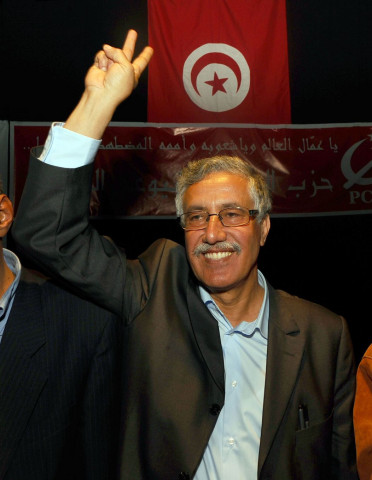Tunisia's opposition threatens protests after talks fail
Ennahda is responsible for the failure of the negotiations as it does not want to leave power, said Hamma Hammami.

Hamma Hammami, a senior leader in a coalition of over a dozen secular opposition parties agitating for new elections, blamed the Ennahda party heading the government coalition for the collapse of two weeks of mediated talks.
Hamma Hammami, a senior leader in a coalition of over a dozen secular opposition parties agitating for new elections, blamed the Ennahda party heading the government coalition for the collapse of two weeks of mediated talks.
The talks aimed to lead to new polls that analysts say the unpopular Ennahda would probably lose, ending Tunis's experiment without the violence seen in Egypt after the army overthrew Muslim Brotherhood President Mohamed Morsi in July.
"Ennahda is responsible for the failure of the negotiations because it has shown it does not want to leave power despite the crisis that has rocked the country," Hammami told journalists after a meeting with Hussein Abassi, head of the powerful UGTT trade union federation mediating the talks.
"The opposition will launch a major protest campaign from Saturday to force the government to step down", he added.
Tunisia, birthplace of the Arab Spring revolts, has been in crisis since late July after the second assassination this year of a secular politician by suspected radicals prompted the opposition to demand the government quit immediately.
The million-member UGTT, the only national organisation with the muscle to push the parties to a compromise, has proposed the government step aside for a caretaker cabinet to hold new polls.
But Ennahda and its two small secular coalition partners said they would only be ready to step down after a month. It had earlier announced it wanted time for a commission to finish work on drafting a new constitution.
"The coalition does not accept the humiliation that the opposition seeks to impose through an immediate resignation," government spokesman Mouldi Riahi said.
The opposition coalition, called the Salvation Front, came together after the murder of the prominent secularist politician Mohamed Brahmi on July 25, six months after another leftist leader was gunned down.
The opposition led mass protests and the assembly writing the new constitution suspended its work, throwing the country into its worst political crisis since autocratic President Zine al Abidine Ben Ali was overthrown in January 2011.
That revolution unleashed unrest across the Arab world, unseating rulers in Egypt, Libya and Yemen, and leading to a civil war in Syria.












1724319076-0/Untitled-design-(5)1724319076-0-208x130.webp)






COMMENTS
Comments are moderated and generally will be posted if they are on-topic and not abusive.
For more information, please see our Comments FAQ